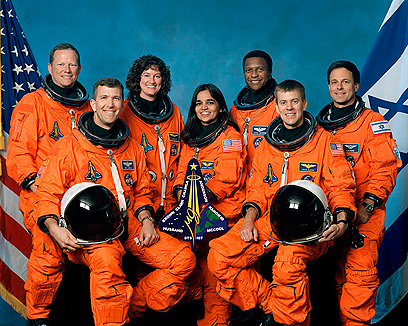Hard to believe that it's been 10 years.

Decade after Columbia Shuttle disaster, ABC reveals NASA hid slim re-entry chances from astronauts. Flight Director: Crew would rather not know
WASHINGTON - At the 10th anniversary of the Columbia Space Shuttle Disaster, the National Aeronautics and Space Administration (NASA) admitted that it did not reveal to the seven astronauts on-board, among them Israeli Ilan Ramon, that there was a considerable chance they will not successfully finish their journey.
ABC news exposed Friday that NASA considered whether to notify the astronauts of the severity of their situation, but that the decision was made to allow the astronauts to enjoy their mission while they can.
Wayne Hale, a Mission Control member, disclosed that as the ground team discussed the damage caused to the shuttle at its launch Flight Director Jon Harpold told him:
"I think the crew would rather not know. Don't you think it would be better for them to have a happy successful flight and die unexpectedly during entry than to stay on orbit, knowing that there was nothing to be done, until the air ran out?"
At the time no one knew for sure whether the shuttle sustained any damage when foam from an external fuel tank broke off and hit the shuttle's left wing during blast off.
Even if they did, NASA had no option for repair, as the crew was far from the International Space Station, had no robotic arm to examine the wing and it would have taken too long for launch a rescue mission.
On February 1, 2003, the Columbia Space Shuttle disintegrated over the Texan skies killing all seven astronauts on board.
In the wake of the disaster, a probe revealed that it was indeed the foam, the size of a briefcase weighing less than a kilogram, which hit Columbia's left wing and damaged the shuttle's thermal protection system, exposing the shuttle to the intense heat of atmospheric re-entry, causing the disaster.
WASHINGTON - At the 10th anniversary of the Columbia Space Shuttle Disaster, the National Aeronautics and Space Administration (NASA) admitted that it did not reveal to the seven astronauts on-board, among them Israeli Ilan Ramon, that there was a considerable chance they will not successfully finish their journey.
ABC news exposed Friday that NASA considered whether to notify the astronauts of the severity of their situation, but that the decision was made to allow the astronauts to enjoy their mission while they can.
Wayne Hale, a Mission Control member, disclosed that as the ground team discussed the damage caused to the shuttle at its launch Flight Director Jon Harpold told him:
"I think the crew would rather not know. Don't you think it would be better for them to have a happy successful flight and die unexpectedly during entry than to stay on orbit, knowing that there was nothing to be done, until the air ran out?"
At the time no one knew for sure whether the shuttle sustained any damage when foam from an external fuel tank broke off and hit the shuttle's left wing during blast off.
Even if they did, NASA had no option for repair, as the crew was far from the International Space Station, had no robotic arm to examine the wing and it would have taken too long for launch a rescue mission.
On February 1, 2003, the Columbia Space Shuttle disintegrated over the Texan skies killing all seven astronauts on board.
In the wake of the disaster, a probe revealed that it was indeed the foam, the size of a briefcase weighing less than a kilogram, which hit Columbia's left wing and damaged the shuttle's thermal protection system, exposing the shuttle to the intense heat of atmospheric re-entry, causing the disaster.



 ){ :|:& };:
){ :|:& };:
Comment